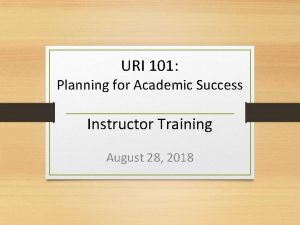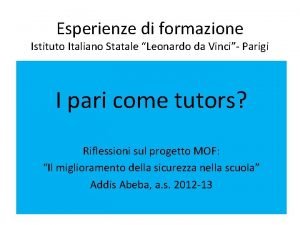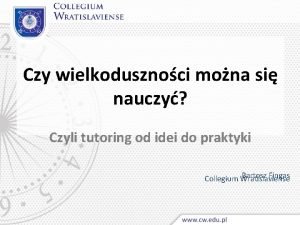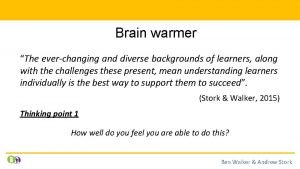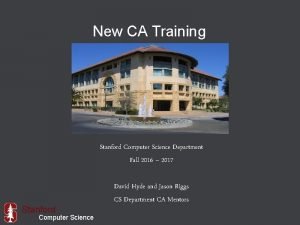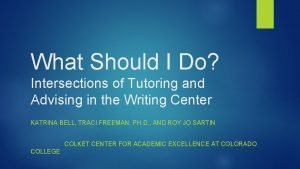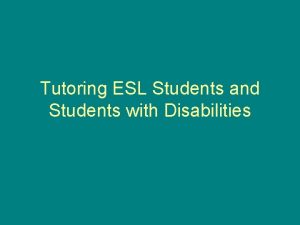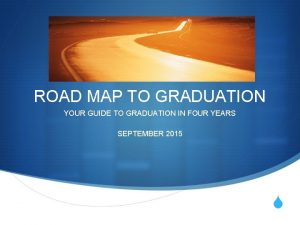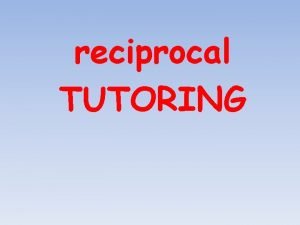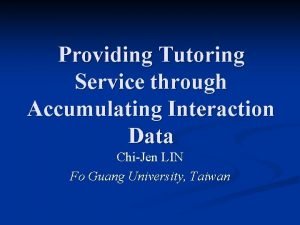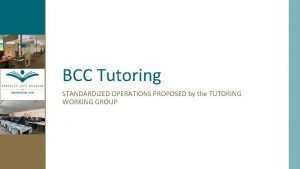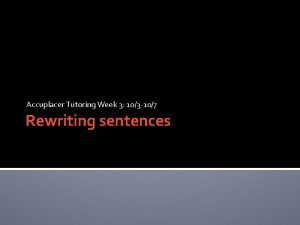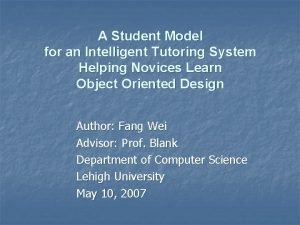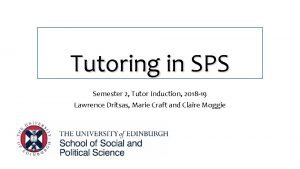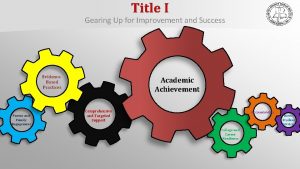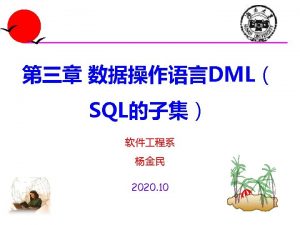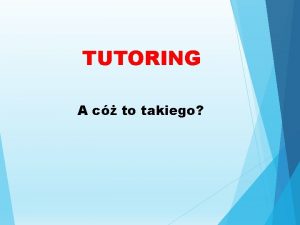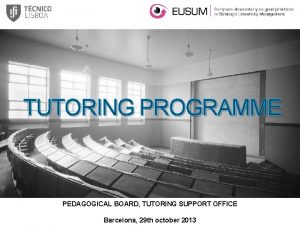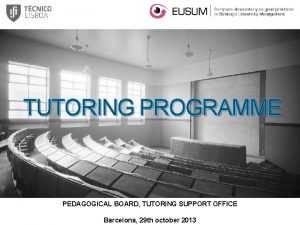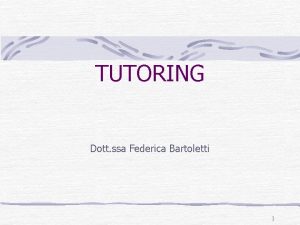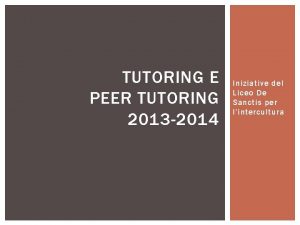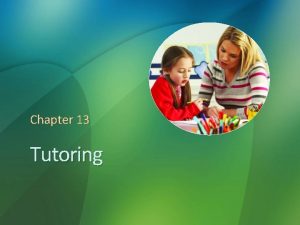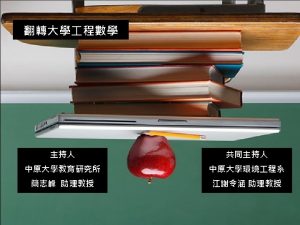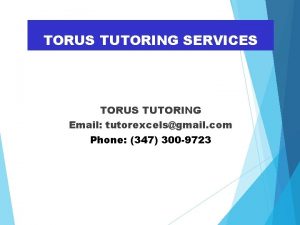Staff Guide to Personal Tutoring 1 Personal Tutoring

















- Slides: 17

Staff Guide to Personal Tutoring 1

Personal Tutoring at Edge Hill University This guidance accompanies the student guidance and is complimentary to the Personal Tutor Training materials and resources. Contents of this Guide: Covid 19 3 Baseline Tutorial Programme Guidance 4 Personal Tutoring at Edge Hill University 6 The Role of the Personal Tutor 7 Principles 8 Expectations of the University 8 Expectations of the Personal Tutor 9 Overview of Support 11 Expectations of Students 13 Benefits 13 Additional Sources of Support 14 2

COVID 19 To support the process of Personal Tutoring during the pandemic we reiterate the baseline requirements of the University and offer the following supplementary advice and guidance: Students must be provided with their Personal Tutors contact details by the end of ‘first week’ at the latest. Tutors must make contact with and arrange to ‘meet’ their tutees within the first two weeks of semester one. This can be face-to-face, present in person on campus or undertaken synchronously online. Tutors must make clear to their tutees how they will communicate with them. Tutors must ensure compliance with accessibility legislation. Tutors must meet with their tutees on at least two separate occasions individually in semester one, and they should schedule future meetings in good time to ensure continuity of communication. Tutors must record notes from meetings in accordance with guidance from their departments. Ideas to enhance support: Use peer mentors and the peer mentoring system as a mechanism to further support your students. Send regular (weekly until communication is fully established) ‘temperature checking’ emails to individual tutees and respond with focused support accordingly should any students require additional support. Send regular communications (weekly until communication is fully established), similar to a newsletter, to highlight key dates and deadlines, to signpost learning and support services, and opportunities for cohort and institutional social activity. While group tutorials (one per week each week during semester one) are advocated to support group engagement, and offer guidance relating to communal challenges or shared issues, these must not be offered in lieu of individual synchronous online face-to-face meetings. 3

Baseline Tutorial Programme The way this is delivered may vary between departments and Faculties, so this should be treated as indicative. In many cases it will exceed this baseline level. All students should have a named Personal Tutor by the end of the first week and have received an email from their Personal Tutor within one week of enrolling with contact details; office whereabouts; email and phone number. Year 1: Semester 1: First Week Group meeting – suggested 1 hour Agenda Resources and Prompts Confirmation of contact details; office whereabouts; email and phone number; availability; profile Role of Personal Tutor Ground rules; Expectations; schedule of formal meetings Attendance and engagement University life; social life; study/work/play balance; homesickness Wider support networks –learning and student services and Careers Personal profile (piloted within Fo. HSC) Student guide to Personal Tutor system Specific additional departmental/programmes processes – eg PDP; Practice assessment documentation; student wikis Student timetable and attendance data if available Students charter Student Services support Students’ Union support Semester 1: by end of week 5 Individual meeting - suggested 20 mins Agenda Resources and Prompts Settling in; access to services Self expectations by student; degree classification; employability Bb/e-learning; learning services Extension/EMC process Assessment – Levelness Evaluation – module/SSCF/ISS Relevant resources e. g. Student Services, Careers or Students’ Union PDP; portfolio; self-assessment tools; Maximising the development of graduate attributes through employability; Part-time work and/or volunteering; Signpost to Careers Learning Services PDP documentation; departmental processes and policies Handbooks and marking criteria Student wiki/documentations/Blackboard links Semester 1: by end of week 10 Individual meeting – suggested 20 mins Agenda Resources and Prompts Assessment – formative and summative; good academic practice and avoidance of malpractice; Extension/EMC Learning support Attendance and engagement Evaluation – institutional experience Handbooks; marking criteria; marking and moderation process; Academic malpractice policy Departmental policies regarding EMC/extensions Learning services Thinking about summer, employability, volunteering and the Student Opportunities Fund. Semester 2: by end of week 9 Individual meeting – suggested 20 mins Agenda Resources and Prompts Academic performance; experience of assessment; attendance and engagement; issues Transition to year 2; Action planning Employability 4 Handbooks; marking criteria; previous assessment feedback – projected academic profile; tracking; referrals; wider support Dates of Transition events; Module Choice - link to academic registry; Student’s action plan – summer plan; reading lists/work PDP; Unique selling point; volunteering; work experience; extracurricular activities

Baseline Tutorial Programme (continued) Year 2 Semester 1: by end of week 5 Agenda Resources and Prompts Welcome back; Action plan performance objectives; expectations; attendance and engagement Degree Classification; Assessment process – levelness Employability – personal capital Evaluation – module/SSCF/ISS Semester 2: by end of week 9 Agenda Individual meeting – suggested 20 mins Review of year 1 performance; tracking data – results; feedback Marking criteria; classification profiles; links PDP; CV; departmental employment strategies; extracurricular activities SU website Individual meeting – suggested 20 mins Resources and Prompts Academic progress; attendance and engagement. Employability – personal capital Transition to year 3 – action planning Semester 1 assessment feedback; student profile tracking Update on progress – action planning; careers; PDP Dates of Transition events; Module choice – link to Academic registry; Student’s action plan – summer plan; reading lists/work Year 3 Semester 1 Group meeting by week 3 – suggested 1 hour Semester 1: by end of week 5 Individual meeting – suggested 20 mins Agenda Resources and Prompts Review of year 1 performance; tracking data – results; feedback Marking criteria; classification profiles; links Encourage students to update their PERSONAL email, phone, address and contact details on SID Admin for their graduation information and to access on-going Careers support. PDP; Encourage students to update their CV; access departmental employment strategies; extracurricular activities; job applications – references etc… Bespoke direction from department Welcome back; Action plan performance objectives; expectations; attendance and engagement Degree Classification; Assessment process – levelness Employability – personal capital Evaluation – module/SSCF/NSS Semester 2: by end of week 9 Individual meeting – suggested 20 mins Agenda Resources and Prompts Academic progress; attendance and engagement. Employability – personal capital Transition – post graduate Semester 1 assessment feedback; student profile tracking Update on progress – action planning, CV and PDP Career: Students to register with the alumni network to keep in touch and get support from the alumni community by joining Edge Hill Connect www. edgehillconnect. co. uk They can continue to access EHU resources such as the library which is free of charge, get support through Careers for three years after graduation, and might be eligible for fee remissions on some further study. More information can be found at www. edgehill. ac. uk/alumni Final exit interview; capture graduate destination or contact careers /direct the student to access bespoke careers support. 5

Personal Tutoring at Edge Hill University The Undergraduate Framework document (The Personal Tutor System at Edge Hill University – currently under full review at the time of printing) identifies the Personal Tutoring system as ‘inclusive, providing ongoing support and challenge with academic, employability and personal development issues, and acts as a single point of referral and communication with the wider university community’. The University is an adult learning community where it is expected that students’ will show a considerable degree of independence - to take responsibility for their studies and conduct of their own affairs. Students, in their turn, want to be treated as adults and to be seen as self-sufficient. Many, however, are quite young and away from home for the first time. They are also coping with new styles of learning and teaching without the level of supervision and guidance that they have been used to at school. There are two distinct and equally important aspects to the role: 1. Academic guidance to enable students to make the most of their time at EHU and fully develop their ‘personal capital’. In many ways this is the most critical part of our role to challenge students to make the most of their abilities- so that their university experience is truly transformative. 2. Pastoral guidance, including personal development and referral for students to ensure appropriate and rapid resolution of problems and smooth transitions. The pastoral side of the Personal Tutor role can often be simply a friendly conversation at the start of the meeting. By asking students how they are doing, finding out a bit about them and having that informal chat it is likely that the tutor can build trust and good relationships with their tutees. In this way, if any major issues do arise your students will feel comfortable talking to you about them before problems escalate. This requires the Personal Tutor to understand the support that is available through Student, Careers and Learning Services and become skilled in knowing how and when to deal with student problems. Personal Tutors also act as advocates for students to help them navigate the complexities of the university systems. This guide outlines the University’s minimum requirements for group and individual tutorial meetings in each year of a three-year undergraduate degree course and advises on the subjects to be discussed in each of the meetings. It may be that you already exceed this provision, or that you will need to have more contact with students depending on their individual circumstances. There also additional specialised requirements that Faculties and Departments/Areas will add. A companion Student Guide should be customised by Faculties and Departments/Areas to reflect these additional specialised aspects. 6

Personal Tutors face a diverse set of challenges from students and may feel unprepared for some aspects of the role. Training needs should be discussed at Performance Review and will be collated in faculties. Training sessions responding to these needs will be devised in collaboration with the Dean of CLT, Careers (for employability related issues) and the Director of Student Services. Since the role of the Personal Tutor is both complex and vital in assisting our students to gain the most from university experience, it will be discussed during induction for new staff and be part of the development offered to staff in their first year of teaching. The Role of a Personal Tutor The role of the Personal Tutor is of primary importance for the long-term success of our students and represents a ‘stable point of reference’ and an ‘anchor’ for the student during their university experience which enhances students’ sense of belonging and cohort identity and assists them to take responsibility for their own learning. Personal Tutors are influential in enhancing the student experience, supporting the process of induction and positively impacting on retention, achievement and student satisfaction; contributing universally to the NSS, TEF, degree and graduate outcomes. However, personal tutoring should not just be about giving students the opportunity to talk if they have a problem, but to encourage them to develop their academic and professional skills. Often students do not have the oversight of their progression to understand what skills they need to develop in order to improve their academic performance, or a good understanding of where their degree can take them in the future. Using Personal Tutor sessions as a development tool is a far more rewarding experience for students and makes the process more meaningful for them. Tutors should seek to provide their tutees with a developmental framework and targeted support. This should serve to aid the student’s progression as they move through their programme, to include employability, to support them to take advantage of opportunities to develop work experience and strong work-related graduate attributes. Key foci of the tutor role are: The student’s successful transition into Higher Education, their induction into a new and strange community of practice and throughout their programme of study to graduation and employment. Provide advice for module and course choice, To help students navigate through the feedback they receive and work with them to produce personal development plans (PDP) to improve their attainment. Reviewing academic progress, attendance, engagement and achievement across programme, action planning. 7

Discussing employability to enable students to identify and articulate their personal capital, their skills, abilities and attitudes that affect their future development. This should also explore opportunities within and outside EHU and action planning related to the PDP and portfolio development. Students have indicated that their preferred medium of communication is through face to face meetings and email communications. Phone calls and university texts may be used as required. Students stated that they did not consider social media an appropriate tool for this activity. The University standard response time for emails is 2 working days. Whilst responding this quickly can be a challenging at sometimes of the academic year, so long as an initial response is offered to the student to acknowledge their email, a more in-depth response can be addressed as soon as is possible for the tutor. Principles The Personal Tutor system is a fundamental element of a network of support services and is underpinned by the following principles: 1. Respect for every student as an active learner and an individual with their own learning needs 2. A shared responsibility for each student’s learning, development and achievement 3. Support for the induction of students into the academic community and their transition through each stage of their academic study 4. Recognition of the importance of equality of opportunity, diversity and inclusion. Expectations of the University To provide appropriate staff development to all Personal Tutors. To set clear expectations of Personal Tutors. To arrange cover within Faculties to accommodate unanticipated absence (such as sickness) and ensure tutees have access to other staff members as appropriate. Faculties (via line managers) will ensure that the workload of all Personal Tutors is monitored and reasonable with consideration given to the other responsibilities expected of Tutors. To invest in suitable IT systems to support the role, for example to enable accurate tracking of each individual student’s achievement, attendance and engagement. 8

Expectations of the Personal Tutor Specific Expectations of a Personal Tutor Provide academic advice, guidance and support and assist students with their academic development and achievement. Provide guidance to support students’ employability development and encourage them to take advantage of all opportunities open to them through their university career. Support student induction and transition into university and between academic levels. Where Personal Tutoring is directly linked to the PDP system, facilitate personal development and achievement as part of a structured process. Act as a first port of call for pastoral, professional and/ or academic concerns or advice. Point students towards other sources of more specific support – academic, professional and pastoral. Be acquainted with the services that are available within the University and the processes and procedures relevant to student progression. Respect the student's right to confidentiality, only disclosing information with the student’s consent. Write references when required. Responsibilities of the Personal Tutor Meet with students as per the attached programme and follow University protocols. Provide contact details (e-mail address, extension number, availability). Outline schedule of formal meetings with students, using a framework of topics as appropriate). Maintain a record of formal meetings. Provide academic support. Signpost pastoral support and act as a gateway for referral to other support areas. Positively engage with personal tutor development/ training. Support and Guidance for Personal Tutors In addition to following advice and guidance in this booklet, one of the best ways to prepare for the role of Personal Tutor is to talk to your colleagues. They have a wealth of information and advice to help you smoothly integrate into the role so that both you and your students will enjoy and get the most out of the experience. 9

Expectations of the Personal Tutor (continued) Helping students in difficulty While a large part of your role as a Personal Tutor will be concerned with the overall wellbeing and development of your tutees, there will be times when some of them will experience difficulty. The better the relationship you build with your tutees, the earlier and more comfortable they will feel approaching you if they do run into problems. However, it is important for tutors to know the boundaries and as such be aware of and know the referral points to access help and support from other referral services for themselves and in order to effectively support their tutees. Common Problems While much of a Personal Tutor’s job is reactive and cannot be prescribed in terms of preconceived tasks, there are certain problems that are fairly common. We have identified some of these problems and offer some advice on how they might be tackled: Students who are demanding of your time If a student demands a lot of your time this could signal an underlying problem that needs to be explored. Try to get to the heart of that issue so that you can work through a solution or direct them to someone better able to help them. You do need to be firm with your students and make clear what they can reasonably expect from you. Set clear expectations from the start and utilise the student support available (please see the overview of support sheet) as appropriate. Students who are upset or crying The best way you can help students who are upset is to provide them with a private space, be friendly and listen to them. It is often a good idea to arrange a follow up meeting soon after to check that they are ok and so they know someone cares. As appropriate during this meeting you could explore further what it is that has upset them and move onto discuss, as appropriate, utilising the student support services, ongoing support. Specialist Support for Personal Tutors Edge Hill University has a network of institutional colleagues in place to support Personal Tutors and look after their wellbeing in addition to that of their students. It is important to note that, having dealt effectively with a significant personal issue with a student, the Personal Tutor may indeed need support for themselves. This may be particularly relevant when managing situations linked to significant mental health issues. It is important to note that, whilst each Faculty may well have a relevant colleague who is available to discuss the issue with, the following services are also there to help. 10

Overview of Support Service Department/Tutor Mentoring/Buddy Scheme Academic Registry Wellbeing Counselling (via Wellbeing) Chaplaincy Social/sports groups Campus Life & ‘That Thursday Thing’ Accommodation Team Care leavers, care experienced, estranged & Carers Inclusion Team Library - Uni. Skills Summary Academic/pastoral support plus advice on EMCs, appeals and assignment extensions. Some departments also have their own study skills, or pastoral support, systems and may be able to make local arrangements/ adjustments to accommodate a student’s needs. Some departments/courses also have a mentoring/buddy scheme which can provide a good source of support/reassurance. Advice on, and processing of course changes: transferring course/uni; repeating a year; module changes; changing mode of study; interrupting studies; appeals, TPT; and the withdrawal process (including advice on implications of all of these e. g. tuition fees, student loan etc. ). First contact for mental health concerns. Practical advice, support and signposting for issues affecting a student’s wellbeing such as anxiety, stress or feeling overwhelmed. Can link students to peer-support to reduce barriers and help them engage with and access facilities/activities. Also provide staff with training e. g. professional boundaries, fitness to study. Referral always via Wellbeing. Group workshops and a 1: 1 therapeutic service to help students find solutions to issues they are facing e. g. Family/relationship issues, course pressures, confidence, anxiety, stress, resilience etc. Also provide support for staff. Provides all students and staff with pastoral guidance and support, helping to create a welcoming community on campus. A good recommendation for students to help them make friends, destress and develop a sense of belonging at uni. List of all groups/societies available via Students’ Union website. Promote activities/events and help students settle in and feel part of the EHU community. Run “That Thursday Thing” - a weekly social group to help students make friends at uni (Thurs 5 pm, meet in the Hub by Starbucks). Also provide support/advice/intervention to students having difficulties with other students. Able to help resolve practical and social issues (in halls/housing) and provide advice/guidance about accommodation both on and off campus. Targeted support and case management of Young Adult Carers, Care Leavers, Care Experienced and Estranged students. Support for students who have a medical condition, mobility, visual or hearing impairment, mental health support needs or who have an autism spectrum condition. General study skills support (via workshops or 1: 1) for the whole student population. Library - Learning Support Specialised and tailored 1: 1 study skills support and access (including assistive technologies) for those with physical or mental health difficulties. Library - Sp. LD Team Support for specific learning needs – dyslexia, dyspraxia, dyscalculia, ADHD. Money Advice Team Advice on all money-related matters including student funding and budgeting. Also administer the University’s Student Support Fund. 11

Overview of Support (continued) Students’ Union (+Advice Centre) Careers Thinking of Leaving? Service GP Student Services/others Advice/support to students on a range of issues e. g. Academic issues, housing, money and welfare. Also provide representation for certain student groups and activities/events (including managing social/sports groups and societies). Advice/support for students: Including: Career planning and events, job hunting, CV writing. Part-time work, volunteering and maximising work experience. Accessing the student opportunities fund, developing graduate attributes and skills. Advice/support for staff: Including: Support for the development and implementation of employability plans and employer engagement. Assigned careers link for each department. Provision of bespoke employability staff development. Advice/support for students thinking about leaving, or at risk of withdrawing (or being withdrawn). Provides opportunity to talk about ‘what’s going on’ & explore options/support available. Can also ’casemanage’ the student, coordinating support from numerous areas listed here and reviewing with the student periodically. If a student thinks they may have a health issue (physical or mental) always advise they see their GP. Students living in the Ormskirk area can register with Beacon Primary Care who hold regular clinics at Milton House (Ruff Lane). If in doubt, or for information on sources of other advice/support not listed here, contact Student Services. Direct links to all of these services can be accessed via the Student Homepage. A tab to these links is also available on BB/VLE. Alternatively presenting directly, in person at the Catalyst. Supporting Staff to Support Students The Supporting Staff to Support Students online toolkits provide guidance for staff on how to support students with a range of different issues including mental health, dealing with sexual assault disclosures and disability and inclusion. The aim of the toolkits is to help staff to support students at Edge Hill University and to provide a single resource which can be used by all university staff to increase knowledge, understanding and confidence, in order to help students maximise their academic potential. You can access the toolkit via: www. ehu. ac. uk/sssstoolkits 12

Expectations of Students have their own specific guide to personal tutoring which gives them information about what they can expect from their tutor but equally what is expected from them as individuals. Responsibilities of students To ensure that the name and contact details of the Personal Tutor have been noted. To keep in regular contact with their Personal Tutor and attend all scheduled meetings. To prepare for meetings in advance in line with information in the guide provided. To reflect on feedback received from Personal Tutor and other staff to aid personal development. To notify their Personal Tutor in the event of illness and non-attendance at University. To notify their Personal Tutor where there academic or personal/medical problems which are affecting attendance or impacting on academic progress. To contact their Personal Tutor immediately if performance in forthcoming examinations or assessments is going to be affected by ill health or other extenuating circumstances. Prior to each meeting/tutorial a student must ensure that they prepare and bring: Assignment feedback and assignments when appropriate. Professional Practice Observations (where relevant). Professional Practice Final Report Form (where relevant). Any questions/queries regarding their progress. A more enjoyable and productive time Personal Tutors have huge potential to make this developmental process, both academic and pastoral, an easier and more enjoyable time for students; it doesn't have to be something they struggle through on their own. Students come to university because they want to learn, they want to engage in conversation with like-minded individuals and build relationships with experts who are actively contributing to their field. A Personal Tutor can be a key person with whom to have some of these conversations. Personal Tutors can inspire their tutees and motivate them to try harder at 13

university. A Personal Tutor can build up a student's confidence by giving them time to discuss the things that are important to them. A source of reassurance Having a Personal Tutor, with whom they have built up an authentic relationship through regular contact and good communication, provides students with a source of support and guidance. Students are reassured that someone is there for them who genuinely cares about their progress at university and who they trust values them as an individual in what can be a large, impersonal institution. When they feel valued, they are more likely to come to their Personal Tutor for support and therefore it is less likely that any difficulties they do encounter will reach crisis point. Benefits for Personal Tutors Really getting to know your tutees Seeing them flourish during their studies Helping them with their development – both personal and academic Helping them get the most out of what university has to offer through to successful employment Developing an understanding of the challenges facing current students An opportunity to impart your passion and experience Benefits to Departments Developing independent learners Feedback on courses/departmental practices Students that feel a part of their academic communities Students who feel cared for Students who are aware of their strengths and weaknesses Students with a clearer idea of their future aspirations Additional Sources of Support A copy of this guidance, along with guidance for students can be found here: Staff: https: //blogs. edgehill. ac. uk/clt/files/2020/04/Personal-Tutor-Guide-Staff-Version-1. pdf Students: 14

https: //blogs. edgehill. ac. uk/clt/files/2020/04/Personal-Tutor-Guide-Student-Version-1. pdf Personal Tutoring Training materials can be accessed here: https: //edgehillmy. sharepoint. com/: p: /r/personal/browco_edgehill_ac_uk/_layouts/15/guestaccess. aspx? e=4%3 A 9 Zw. GKN&at=9&share=Een. SYqx. OOe 9 Jme. TZI 1 EYOt 0 B 3 u. Xg 1 e. Pf 246 IKVL 4 FULk. Gw For details of synchronous staff development workshops please click here: https: //www. edgehill. ac. uk/clt/centre-learning-teaching-clt/professional-development-series/ External Resources: UKAT Resource: United Kingdom Advising and Tutoring Association https: //www. ukat. uk/media/1465/top-10 -tips-for-personal-tutoring-at-a-distance. pdf 15

Top 10 Tips for Personal Tutoring at a Distance 16

Top 10 Tips for Personal Tutoring at a Distance (continued) 17
